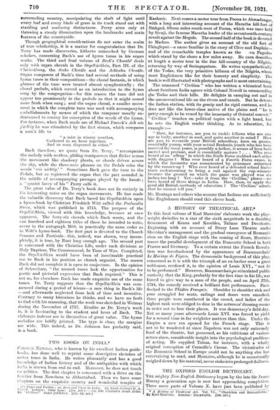TWO BOOKS ON INDIA.*
(101.0N:3L Nnwuer,, who is known by his excellent Indian guide- books, has done well to reprint some descriptive sketches of motor tours in India. He writes pleasantly and has a good knowledge of Indian history and of the antiquities with which India is strewn from end to end. Moreover, he does not touch en politics. The first chapter is concerned with a drive on the frontier from Nowshera to Abbottahad. Then we have some chapters on the exquisite scenery and wonderful temples of (I) Topee and Turban ; or, Ilere and 7 here in India. By Lieut.-Colonel II. A. 1CO3.11. London: John Lane. 121e. net.]—(2) The Civilian's South India. by civilian." Same publisher. 112s. nd. net.1
Kashmir. Next comes a motor tour from Poona to Ahmadnagar, with a long and interesting account of the Maratha hill-fort of Sinhgad, fifteen miles south-west of Poona, which was once held by Sivaji, the famous Maratha leader of the seventeenth.eentury revolt against the Moguls. The second half of the book is devoted to Madras. The author gives an acoount of the old fort of Chinglcput—a name familiar in the story of Clive and Dupleix-
and of the remarkable temples known as the ;en Pagodas which stand by the shore a few miles away. He then describes
at length a motor tour in the fine hill-country of the Nilgiris, returning by way of Seringapatam. He writes sympathetically of the Todas, the very primitive hillmen of the Nilgiris, whom most Englishmen like for their honesty and simplicity. The book is well illustrated with photographs and is most entertaining.
The unnamed " Civilian " who has written a whimsical book about Southern India agrees with Colonel Newell in commending the Todas and their hills. He delights in camping out and in
the unconventional life on the rivers and canals. But he detests the Indian station, with its gossip and its rigid customs, and ho
does not like the lower-class native of the plains and " he is petty enough to be vexed by the immensity of Oriental conceit."
" Civilian " touches on political topics with a light hand, but he sets the English reader thinking. As to education, for example :- " How, for instance, are you to tackle fellows who are one age in body, another in soul, and quite another in mind ? How are you to reconcile your British schoolboy, keen on games, essentially young, with your actual Brahmin youth who has been married for some years, is possibly a father, is aware of love both sacred and profane, and is essentially mature ? . . . Who ever heard of an affray ' in which the Sixth Form stabbed each other with daggers ? Who ever hoard of a Fourth Form exam. in which the favourite was assassinated by poisoners suborned by the runner-up ? Who ever heard of a defeated school footer team endeavouring to bring a suit against the cup-winnorq because the ground on which the game was played was six inches too long ? Yet—take it from the Civilian,' please—we have heard of these things in India. How, then, to apply the good old British methods of education ? The Civilian' admit; that he cannot tell you."
Mr. Montagu and others who assume that Indians are sufficiently like Englishmen should read this clever book.










































 Previous page
Previous page